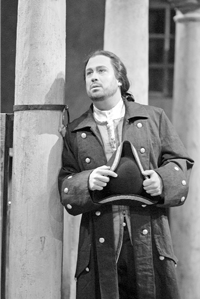Metropolitan Opera’s ‘Rodelinda’ grants Handel his due
The Metropolitan Opera can be a pretty dreary place when presenting an under-cast and under-rehearsed revival. But their new production of Handel’s “Rodelinda” on December 6 was of festival quality, brilliantly prepared and boasting a superstar cast that included David Daniels and Renée Fleming.
I keep trying to like Fleming, but her increasingly mannered delivery just grates on me. Yes, the voice retains a lovely, silky quality, and she looks quite fetching onstage. But her micromanagement of Rodelinda’s music, inflecting every single word and note, robs her of the ability to sing a true legato, and, ironically, veils the sound to the point that her Italian is almost completely inscrutable.
Further, Fleming is not tempermentally a good fit for the role of Rodelinda. The part basically offers only two affects—sorrow and rage. When Fleming gets sad, she tends to whimper, and she lacks the sustained energy to stay really angry. The result is that Rodelinda comes off like a petulant princess instead of a proud queen.
Fleming might profit by emulating her colleague Stephanie Blythe, who sang the secondary role of Eduige. The sheer luxury of Blythe’s velvety mezzo would be enough to guarantee her a success, but she offers immaculate line, perfectly tuned coloratura, nobly declaimed recitative and a majestic stage presence as well. Glamorously gowned in black silk taffeta and moving with grace and determination, Blythe looked every inch the diva.
Another member of the cast projected diva vibe; unfortunately, that was Bejun Mehta, whose portrayal of the stalwart mentor Unulfo suggested a particularly soubrettish Cherubino. Luckily though, Mehta’s singing is anything but girly. The voice is huge for a countertenor, a real contralto color with a seamless transition into a sumptuous chest register. His agility is nothing short of superhuman, and by that I mean his coloratura is faster than a speeding bullet, and he never seems to have to breathe.
In contrast, David Daniels is not a superman; in fact, it’s his very humanity that makes him so great a singer. He has something very personal to communicate, and somehow he makes all 4,000 audience members think he’s singing to them individually. Besides haunting beauty of timbre and a magnetic stage presence, Daniels is master of a legato so flawless that one hardly notices the act of his singing; he just opens his mouth and gorgeous music comes out. Of course, such “effortless” art requires the most stringent effort, but this singer never lets you see him sweat.
The high point of Daniels’ performance came early in the evening with his entrance aria “Pompe vane di morte,” in which the exiled Bertarido longs for his beloved wife Rodelinda. His singing communicated a muted sadness without a hint of sentimentality; this is a man strong and noble enough not to need anyone’s sympathy. Daniels also connected beautifully with his third act prison arioso. However, in the fiery “Vivi tiranno,” he was less successful. The brilliant divisions of this aria, though cleanly sung, lacked the ultimate in focus and ping, and at times were even covered by the orchestra.
Stephen Wadsworth’s staging aggravated the problem, which had Daniels bolting madly about the stage while the set, a whole Tuscan villa, shifted behind him. But location doesn’t really matter much in this opera; with its string of intimate arias the structure is like that of a film made up almost entirely of closeups. And so we don’t need all those stuccoed walls and grand salons. Far more welcome would have been an extension of the playing area a few feet forward over the orchestra pit to help the voices project into the vast space of the Met.
Instead of focusing on his principals, Wadsworth sent a gaggle of supers bolting across the stage during a ritornello, and filled the stage with supporting players eavesdropping on the hushed farewell duet for Rodelinda and Bertarido. They’re never going to see each other again; couldn’t they have a little privacy?
My only complaint about conductor Harry Bicket is that he gave us a little too much of a good thing. This “Rodelinda” ran only a minute or two shorter than an uncut “Tannhäuser.” An example of Bicket’s good taste—and perhaps of his negotiating skills—was the consistency of style of his singers’ ornamentation, idiomatic yet appropriate to the individual voice. The orchestra sounded full and rich and yet never anachronistically Romantic, really a model of what big-house Handel should be.
A December 3 visit to a performance of “Vespri Siciliani” late in its run, offered a rare chance to hear soprano Nelly Miricioiu, a specialist in bel canto and verismo literature, but also celebrated for the demanding role of Elena. After a rocky start, all harsh glottal attacks and swooping portamenti, Miricioiu settled in for powerful long-breathed phrases in the Act 3 finale and exquisitely spun-out pianissimo lines in the prison scene.
The flashy showpiece “Mercè dilette amiche” was pretty much a wash; even Miricioiu’s body language communicated discomfort and borderline panic. Fortunately, she pulled herself together for a noble performance of the Act 5 trio, then commanded the stage for a final image of ideal tragic despair.
James Jorden is the editor of parterre box, the queer opera zine at parterre.com.


































